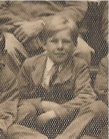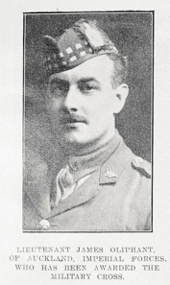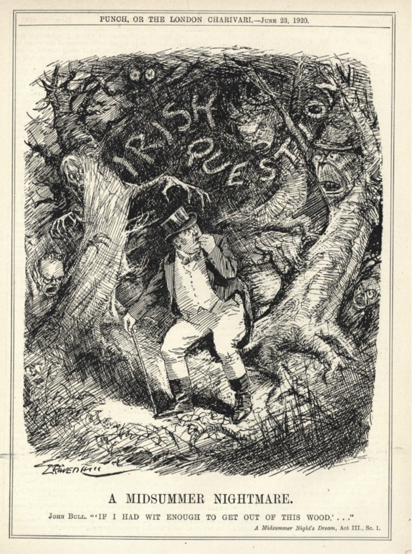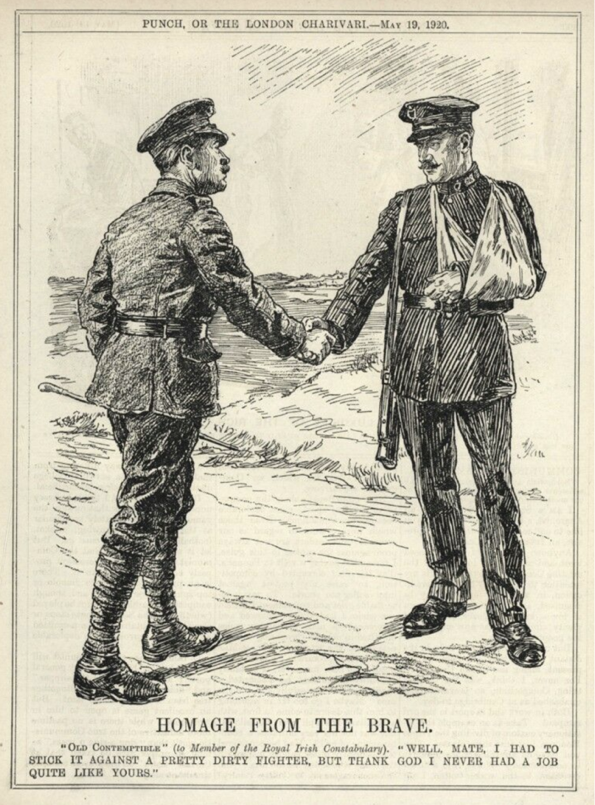29th June - No letter
Secret diary: Tues 1 mile E to2cars. Kerry escort . 11 . 40 miles NE village , P.O. hosp. (3 patients) rly, accident. (rly - railway) Cottage. DIs car daylight
Official diary (29th June): I walked about one mile further East of Mallow and was then taken over by the South West Limerick Brigade I.R.A. and proceeded in two cars with an escort of 11 men to a destination 40 miles away in a North Easterly direction.
Location: Daniel McCarthy's home in Creggane taken by West Limerick Brigade, led by Seán Finn of Rathkeale, to Sheahans of Bearnagh, Templeglentine, .
No letters were sent on the 29th, probably because there wasn't time considering that CHTL had a 40 mile journey and was under a heavily manned guard. Liam Lynch had decided that the responsibility for holding the general should be passed on to the West Limerick brigade:
Liam Lynch had made arrangements to transfer General Lucas to West Limerick Brigade area on June 29th 1920. The car in which Sean Moylan and Paddy Clancy were travelling to collect the prisoner went on fire, and a car the property of the local Medical Officer of Health (Dr. Ryan) was taken to remove the prisoner. The car which went on fire was then pushed a distance of about two miles by Liam Lynch, Ned Murphy, Denis O'Shea, Michael McCarthy and myself [Michael O’Connell]. It was removed from the district next day.
BUREAU OF MILITARY HISTORY, 1913-21. STATEMENT BY WITNESS. DOCUMENT NO. W.S. 1428. Witness Michael O’Connell, Glentane, Lombardstown, Co. Cork. Identity. Quartermaster, Cork IV. Brigade, 1st Southern Division, I.R.A.
A car bursting into flames was something that CHTL was quite familiar with, it having happened to him on at least one occasion during his time in France. Nov 8th 1918:
"Coming back the car was not going well and as we passed through the last village but one it burst into flames, which was rather disconcerting."
A burnt car abandoned in Ireland would have drawn some attention from RIC patrols so therefore it was necessary to make the huge effort of pushing the car two miles to get it out of sight. Acquiring a new vehicle in which to transport their stolen cargo (CHTL), was second nature to the Volunteers: through their extensive network of supporters they soon sourced a suitable and probably more reliable automobile. The local doctor may, or may not, have given his blessing to being parted with his car, which was essential for enabling him to do his job; but he would not have wanted to make too much noise about it being 'borrowed' - upsetting the RIC, British army or the Volunteers was more trouble than it was worth.
CHTL stayed with John and Johanna Sheehan in their farmhouse, Berna, Templeglentine which offered ‘a commanding view of the countryside’ (Aideen Carroll, Tom Toomey Atlas of Irish Independence). As he was leaving the house the General, ever the good mannered gentleman, 'thanked Johanna for the way he was treated. He asked her “what will you get out of this?” She replied “All I want is an Irish Republic.”' (Seán Sheehan, grandson of John & Johanna Sheehan letter to The Irish Times Mon. Jun 9, 2014, Ann Sheehan Irish Times June 20 2020)
Comment from around the world
On June 29 1920, in an article entitled ‘A Sinn Fein Coup’, The New York Times rather harshly described the problem as they saw it from across the Atlantic: the British government refused to recognize the ‘Sinn Fein campaign as a military demonstration against the authority of Great Britain.’ The article continued:
‘There is no fight in the British in Ireland, although they have troops enough if they care to use them. The word seems to have gone around that the Sinn Feiners must not be regarded as belligerents but as disorderly characters who are making a nuisance of themselves. It is hoped that they will wear out their welcome in the countryside, when the whole trouble will be over and the troops can be withdrawn.
Brig. Gen. Lucas, a veteran of the Boer war and the great war, was playing the game according to the official rules. Commander in the Fermoy district, he would have been watching the Sinn Feiners alertly, ready to pounce upon their leaders when an overt act was committed, if he had entertained the view that they were secretly organized enemies with a knack for guerilla tactics, capable of even an imitation of civil war. But he did not keep his finger on the pulse of outlawry or suspect anybody of conspiring against the King. The row in Ireland must not be allowed to interfere with his sporting pleasures. He would go anywhere he pleased and fish or hunt, despite the Sinn Feiners. It was General Lucas who was hunted, and easily trapped. He had invited the snare by not attending to his military duties soberly.’
‘A Sinn Fein Coup’, The New York Times, June 29 1920
It was a similar frustration as was expressed in the New York Times article that made CHTL go off and enjoy his fishing. That was what he told his son, Bob, years later. There was no clear command as to what the army in Ireland was to do. CHTL was a military man who was waiting for the government to give orders for him to follow. He was not a Smyth or a Black and Tan or Auxiliary soldier who would take things into their own hands and make decisions outside the official remit. (One could say that the decisions of Smyth and the Black and Tans were based on an ‘unofficial remit’) The British government would not say that they were at war in Ireland so therefore CHTL reverted to behaving as he did in occupied Germany – he pursued his passion for reel and rod and made the most of the excellent fishing spots around Fermoy.

As Keith Jeffery, writing in his book about Sir Henry Wilson, comments, this wasn't just CHTL being CHTL there was a paradox in the way many British soldiers behaved in Ireland:
The curious combination of ‘normality’ and insurrection which existed in Ireland, even in the early summer of 1920 is illustrated by the case of General Cuthbert, commander of the army brigade in Fermoy, county Cork, who, together with two staff colonels, was kidnapped by the IRA on 26 June. They had been on a fishing trip, staying in a country cottage, apparently taking no special security precautions.
p264 Field Marshal Sir Henry Wilson: A Political Soldier By Keith Jeffery
The three officers had been through four years of bloody conflict, having their freedom to relax and enjoy themselves severely limited and they'd had enough. Ireland was dangerous but nothing like dodging bullets and shells in the trenches. In Ireland British soldiers were being killed but it was in ones or twos not in their thousands like in France. The trio had survived the Great War, they had the survivor's feeling of being invincible.
In recent times a lot of research has been carried out into this phenomenon:
Combat exposure is associated with increased rates of mental health problems such as post-traumatic stress disorder, depression, and anxiety when Soldiers return home. Another important health consequence of combat exposure involves the potential for increased risk-taking propensity and unsafe behaviour among returning service members... Exposure to violent combat, human trauma, and having direct responsibility for taking the life of another person may alter an individual’s perceived threshold of invincibility and slightly increase the propensity to engage in risky behaviour upon returning home after wartime deployment. Source
CHTL, Danford and Tyrrell were survivors, they'd returned home and were deployed in what was considered to be part of Great Britain. They had not been told that they were in a war situation. They knew that there were risks but they were willing to take them. They didn't believe that they were in great danger. They'd survived incredible perils before so the apparent slight risks that they were taking in going fishing didn't worry them. In comparison to Flanders it was nothing. In the words of the grieving parents of a returning US soldier from Afghanistan who was killed in 2005 in a road accident caused by his risk taking:
"It was like he was in prison for a year, and the bird's free ...He thought that nothing could hurt him" Survivors of War Take Fatal Risks on Roads By Gregg Zoroya, USA TODAY, May 3, 200
It is quite clear that CHTL did not want to be in Ireland in the uncertain times that he was experiencing. He desperately wanted to be able to settle down in England with Poppy and their expected baby. He’d had seven years of war in total and had enough. In a way his fishing was a sort of protest, it wasn’t just the Sinn Feiners who were frustrated by those in authority.
The Auckland Star in almost an obituary piece quoted an old acquaintance of CHTL’s:

Mr J Oliphant MC who served as a lieutenant of the 1st King’s own Scottish Borders for three and a half years under General Lucas, in the 29th Division, supplies interesting particulars of the missing soldier. He writes:
"Brigadier-General W Tyndall Lucas, CMG, DSO, was born at Foxholes, Hitchen, England. He studied for the army and passed through Sandhurst, joining the Bucks. He served in India in the Berkshire Regiment and was a brother officer of the late Captain Oliver Steele of Auckland. Captain Lucas went to England early 1914, and was made staff captain on the 87th Brigade, 29th Division. He was present from the landing at Gallipoli until the evacuation and rose to brigade major and finally Brigadier General of the 87th Brigade. The 87th Brigade claimed to be the only international brigade in the British Army. The 1st Royal Inniskillings (Irish), the 2nd South Wales Borders (Welsh), the 1st Border Regiment (English), and the 1st King’s Own Scottish Borders comprised the brigade.
General Lucas was beloved by all as a fearless and intrepid leader. Endowed with great physical strength and strong personality, he is a born leader. He saw practically continuous service throughout the war, and went Home on short leave to be married just before the final advance in France. He served under General Aylmer Hunter-Weston and General de Lisle. He always had the happy knack of rapidly sizing up a position and was a great judge of men. He won his CMG and DSO in the field.''
The writer had a letter from him three weeks ago, and he stated he was commanding a brigade of the 32nd Division in the West of Ireland, and was endeavouring to protect the more peaceful Irishman from his less peaceful neighbour, and incidentally doing a little fishing, though the water at that time was rather muddy. He is still a young man, being only in his forty third year. His one physical disability is the loss of three fingers of the left hand the result of a shooting accident in the Sudan, on which occasion he had to walk 120 miles before securing medical assistance. The indignation of the men under Brigadier- general Lucas’ command can be well understood, and serious trouble will arise if foul play has occurred.”
Auckland Star, Volume LI, Issue 155, 30 June 1920, Page 5
Commanding 'a brigade of the 32nd Division in the West of Ireland', and 'endeavouring to protect the more peaceful Irishman from his less peaceful neighbour, and incidentally doing a little fishing’, sums up how CHTL regarded his existence in Ireland. His happy 'knack of rapidly sizing up a position'; being 'a great judge of men' and 'loved by all'; along with his ‘strong personality' and 'fearless and intrepid leadership skills', all paid their part in his survival during his time in captivity. Here was a man who others instinctively warmed to and who was was recorded in all IRA witness statements as being well-liked and even admired: he was not the stereotype pompous British general that perhaps the IRA were expecting.
The Batman's Story
A newspaper cutting found amongst CHTL’s papers reveals an interesting perspective to the story - that of the Batman. (CHTL’s military servant)
SINN FEIN’S COMMUNIQUÉ,
General’s Batman Made To Carry It To The Barracks.
From Our Special Correspondent,
FERMOY, Tuesday.
In spite of the most elaborate efforts by the military authorities, there is absolutely no clue to the whereabouts of Brigadier General Lucas, D.S.O, he was captured by a party of masked men and carried off in a motorcar.
Aeroplanes have searched every acre of the countryside within wide radius without result.
General Lucas had been in command at Fermoy for 9 months.
The Batman's Story.
In the War Office message it is stated laconically that “a message has been received that General Lucas is to be treated as a prisoner of war.
This message reached the barracks here through the General’s Batman, who, after the departure of the rages with their captives, was compelled by four armed men to remain in the hut until six a.m., after which he was allowed to take the notes into for Morley. The contents had previously been made out to the general.
Written neatly in ink and bearing the illegible signature of the Comandant of the 2nd Cork Infantry Brigade, Republican Army, it explained that intercepted mails having disclosed the generals responsibility of the military administration of a wide area, he was a legitimate prisoner of war, and as such would enjoy all the privileges belonging to his rank.
This historical document is now in hands of the military authorities. It was addressed to
The Deputy Commandant,
Army of Occupation, Fermoy.
That Batman, realising that argument was futile, stoically said “Good night” to his captors and went off to bed.
The authorities are convinced that the general is hidden somewhere in the Cork district, at the most 25 miles from here.
The Sinn Fein’s Object.
With a view to trace the car used by his captors, very strong military pickets have been set out over the district carefully inspecting all cars.
I understand from a source in close touch with the Republican movement that General Lucas will be allowed to write home as often as he likes provided that no indication of his whereabouts is indicated. He will also be allowed a Batman.
I was led to believe that his detention will not last longer than is necessary to demonstrate the inability of the authorities to rescue him.
The General was a captain at the beginning of the war and finished up as a Major General commanding the fourth division.
General Lucas's home is at Welling, Herts, where his young wife is greatly distressed by the news of her husband’s adventure*.
*Please note at this point Poppy did not know about CHTL’s capture and was in London, not Welwyn.

London, Political Debate
Meanwhile back in London Churchill had a lunch with several influential people, including Greenwood and Herbert Fisher who was President of the Board of Education. The letter below was written the following day but expressed Fisher’s argument that the ‘proscription of Sinn Fein was a mistake and that only incitements to illegal actions should be punished, not the mere expression of Irish republican opinions’:
CHAR 2/110/51-53, BOARD OF EDUCATION, WHITEHALL, LONDON, S.W.1
30th June, 1920
My dear Churchill
While I am quite prepared to concur in the suggestion that it may be wise to defer for a few weeks the modification of the Proclamations to which Greenwood alluded at Lunch yesterday. I remain of opinion that the original proscription of Sinn Fein, involving as it did the proscription of all open political life in Southern Ireland, was a profound mistake and I think that if we are to get on to right lines again we ought, while continuing our strenuous policy for the restoration of law and order, to permit open debate of Sinn Fein and other opinions in Ireland. We should not certainly in England regard it as a crime to express a belief in the excellence of a Republican form of Government or to discuss even so serious a constitutional change as the abolition of the Monarchy to be effected by ordinary Parliamentary methods. However repulsive these opinions may be to us, we should think it wise to permit of their expression in order that the counter might be brought into play, and I believe that a great deal of our trouble in Ireland flows from the fact that by proscribing all open discussions and debate we have driven the agitation under ground. I attach also a good deal of general Sinn Fein philosophy will be intermingled with the discussion of municipal affairs. I don’t think we can prevent the Sinn Feiners ventilating their republican views though at present it is illegal for them to do so, and the fact that we shall be compelled in an increasing measure to acquiesce in infractions of the Law is surely a good reason for thinking that the Law might be redrafted.
I think that we are on very strong ground if we adhere to Bonar Law’s principle [see below] that we are not coercing opinion in Ireland but that we are only coercing crime. I don’t see how we can hold that it is a crime to express a wish for an Irish Republic, though it is, of course, a crime to incite people to commit illegal actions to obtain one. The distinction between persecuting opinion and persecuting crime is so elementary and is so much a part of every Englishman’s traditional intellectual equipment that I should have thought that the soldiers who are carrying out our policy in Ireland would recognise its expediency and would welcome it rather than the reverse. I do not believe that British soldiers like the job of putting down opinions, but the suppression of incitements to crime and violence belongs to a different category and is accepted by every code in the world.
Yours sincerely
H A L Fisher
Andrew Bonar Law:
“There is nobody in this House who does not know that, whatever may have been the case in the past—and undoubtedly Ireland was badly used in some periods of her history—for the last generation and more this country has had only one desire, and that is to get on good terms with Ireland. In spite of that we see the situation as it is. You cannot cure it in a day. At the same time I say that this Government must restore decent conditions in Ireland. It is not easy. If there are any in this House who think that it can be done simply by sending scores of thousands of soldiers, it is a great mistake….
…we are going to do what we can to convince not only reasonable Irishmen, but the world, that we are dealing justly with Ireland. The picture is a very black one, but there are some signs that the excesses are having this effect—that they are now being directed against the men who call themselves Sinn Feiners, that they are suffering, and I cannot help thinking that the effect of that on Ireland will be to make them welcome the restoration of reasonable government, and to try themselves to find some way out of the existing impasse…..
.…The one difficulty at this moment is in getting the police force and the military force to co-operate properly."
Andrew Bonar Law, 26th April 1920, House of Commons

The British troops during WW1 had a clear enemy. The RIC (Royal Irish Constabulary) were trying to serve and protect their communities but it was those people who were attacking and even killing them. Many of them had torn loyalties and were also leaving the force to protect their and their families’ lives.

